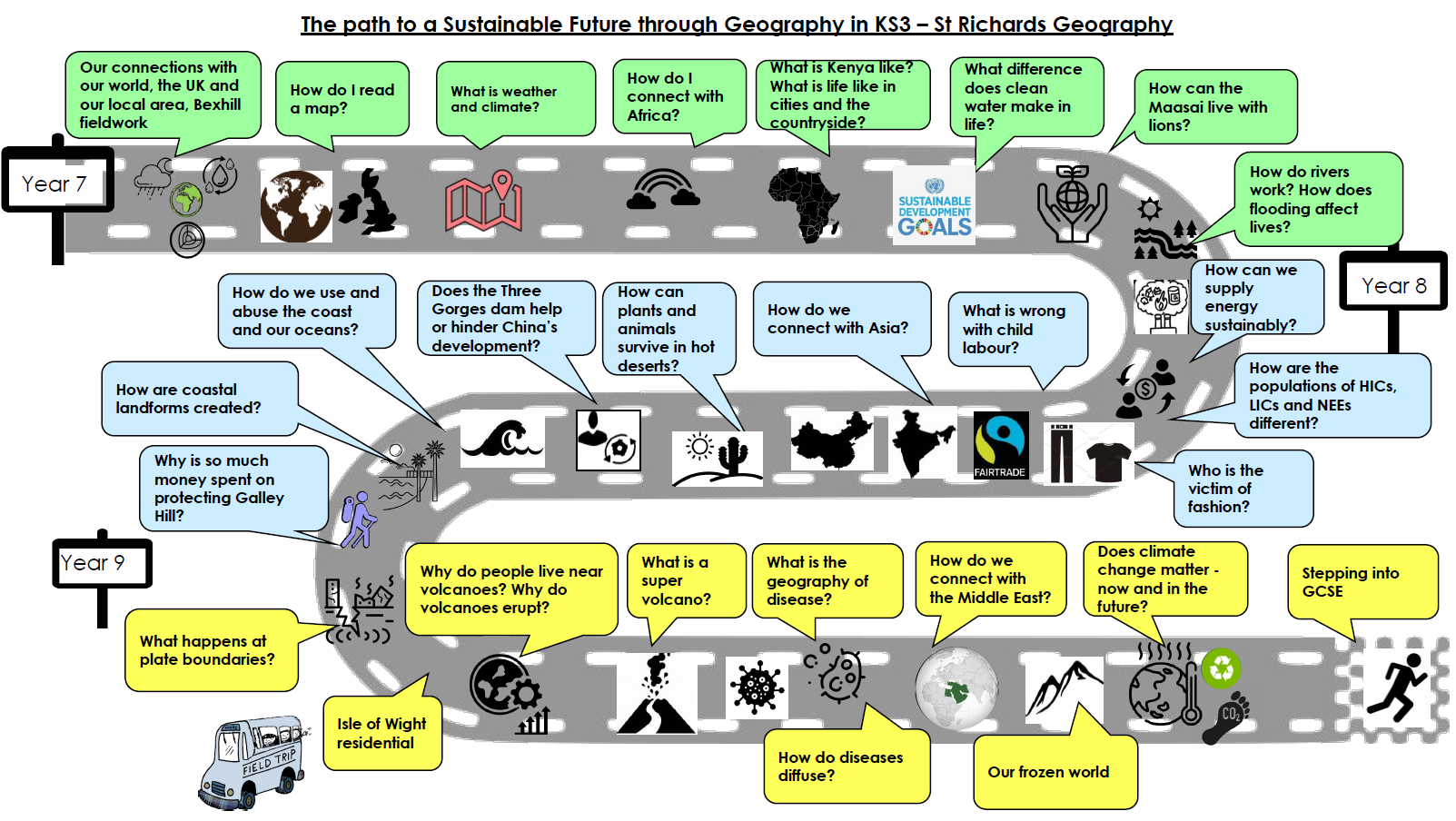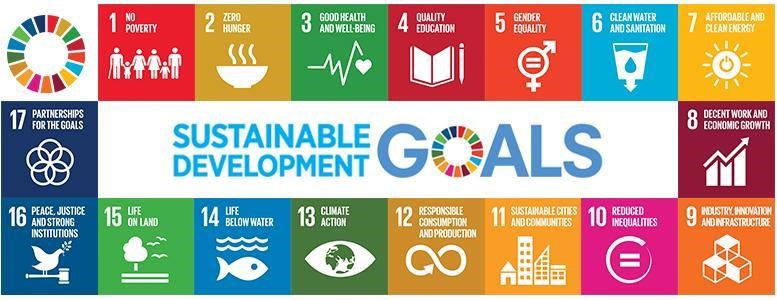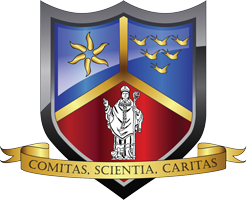Geography
GCSE Geography Exam Results
2023: 87% 4-9, 79.4% 5-9, 43.5% 7-9
2022: 96.1% 4-9, 82.9% 5-9, 56.6% 7-9
2021: 93.7% 4-9, 83.3% 5-9, 43.7% 7-9
2020: 95% 4-9, 77.5% 5-9, 39% 7-9
2019: 82.4% 4-9, 66.6% 5-9, 34.3% 7-9
2018: 83% 4-9; 28% 7-9
2017: 89% A*-C; 39% A*-A
2016: 76% A*-C; 24% A*-A
BTEC Travel and Tourism Results
2023: 60% Level 2 Pass, 34% Level 2 Merit, 14% Level 2 Distinction, 7% Level 2 Distinction*
2022: 83% Level 2 Pass – Level 2 Distinction *, 56% Level 2 Merit – Level 2 Distinction *. 13% Level 2 Distinction – Level 2 Distinction *
2021: 86% level 2 Pass – level 2 Distinction *, 72% level 2 Merit – level 2 Distinction*, 19% Level 2 Distinction – level 2 Distinction*
Key Stage 3 Curriculum
Intent of Curriculum
In Geography, our aim is to enable pupils to question as well as answer their own and other’s questions about the world in which they live. Through our curriculum we hope that pupils will develop a greater understanding of their natural and human world and their place, and more importantly impact on it. We want them to take a responsible attitude towards the world and adopt a life-long learning approach. We want them to ‘think like a geographer’ and be successful global citizens.
In our subject, we are fortunate to be able to teach both in and outside of the classroom and pupils get this opportunity in every year group through experiencing fieldwork activities. Our Schemes of Learning enable pupils to have a holistic knowledge of the subject at Key Stage Three which creates a solid platform to build on at GCSE. We support our learners to develop skills as well as numeracy and literacy, that are transferable across all subjects and employment in later life.
Implementation of Curriculum
We implement this through the aspiration to deliver high quality education which promotes a love of learning about the world. We deliver this through teaching units with topical questions which challenge pupil thinking. For example, in the study of glaciation, the theory of glacial formation is taught to help pupils understand the issues around climate change.
Schemes of Learning are shared across the department and adapted to the needs of the pupils so that they are engaging for all learners. We begin by aiming to fill any gaps in pupil learning from the many feeder schools and this provides the foundations for all learners. This review consists of a variety of different skills and knowledge, including, problem solving, and fieldwork. This is the beginning of their application of knowledge which is key for Geography. Pupils are also encouraged to participate in additional activities outside of their lessons – this may include geographical themed week events, attending drop in sessions for extra support, involving themselves in campaigns run by the award winning Geography Club or attending the annual Isle of Wight residential trip.
Through the framework of the 2014 National Curriculum, human and physical Geography are equally weighted across each year as well as studying one global location in detail. The Schemes of Learning demonstrate that Geography is an investigative subject, which develops an understanding of concepts, knowledge and skills by encouraging new ways of thinking about the world using ‘big ideas’ such as Place, Space and Interconnection. The programmes of study enable pupils to follow and participate in debates in significant local, national and global issues which takes them beyond their own experiences and locality.
Pupils will steadily work out how the world works and how it can and will change in the future. By learning about places that are outside of their own experience, they will develop their understanding of the world’s diversity of environments, people, cultures and economies. They will develop a global ‘open mindness’ so that they can challenge stereotypes and understand the fluidity of key ideas and concepts. Pupils will be able to communicate geographical information in a variety of ways, including through maps, numerical and quantitative skills and writing at length as well as through the use of Geographical Information Systems.
Impact of Curriculum
In Geography, the curriculum should make a profound, positive impact to the outcomes of every child. The subject is ripe to develop a pupil’s spiritual, moral, social and cultural development as well as supporting character education. We will know that this is true as we are delivering a high standard of education, quality assured through qualitative and quantitative measures such as:
- Attainment and Achievement outcomes
- Observing lessons and scrutinising planning
- Standards of learning in books
- Pupil voice
- Destination data and uptake of A-Level Geography
- Attendance data
- Behaviour data

Delivery and assessment
During Year 7 and Year 8 pupils are taught in mixed ability classes. They will either spend terms 1-3 studying Geography or History and then swap teacher and subject for terms 4-6. The course is assessed through a variety of activities including end of unit tests, end of year tests, deep mark assessments and regular interleaving and retrieval in the form of quizzes and key word checks.
The work that will be covered by each group is outlined below and we have made links to the Sustainable Development Goals which is a blueprint for change that countries have signed up to, in the hope of making a real difference to people’s lives.
Sustainable Development Goals

TOPICS /CONTENT STUDIED IN YEAR 7, 8 AND 9
Year 7
● Understand the water cycle and its importance. (SDG 12)
● Describe the stages involved in the water cycle and the outcomes of these processes.
● Explore how flooding affects people differently around the world. (SDG 6)
● Appreciate the power of nature, and how we can work with it to provide a safe and sustainable future. (SDG 12)
- Identify physical and human features in the local area.
- Understand the location of the local area within the UK, and the location of the UK in the world.
- Explain how Latitude, Altitude, Wind, Sea and Ocean Currents influence a climate.
- Analyse the reasons for a range of human features in the local area and how they can be recorded on a map.
- Understand the use of different types of maps and how to read them.
- Understand our connections to Africa.
- Know the physical geography of Kenya.
- Understand the lives of the Maasai Tribes and the importance of ecotourism. (SDG 11)
- Explain the distribution of wealth within Kenya, and how people in the same region can have a very different quality of life. (SDG 3)
- Explore the social, economic and environmental issues that challenge the people of Kenya and how they are responding to them. (SDG 4)
- Explore the importance of clean water and sanitation. (SDG 6)
Year 8
- Identify the human uses of the coastline, conflicts and management.
- Explain the formation of coastal landforms. (SDG 14)
- Investigate through fieldwork the processes and protection measures at Galley Hill, Bexhill.
- Understand the impact on the wider coastline of sea level rise, urban development and tourism, protecting habitats, fishing and energy production. (SDG 13, SDG 7)
- Know about world population growth and how to present this graphically and explain the trends.
- Understand the different types of employment and how these can affect the economy and development of countries. (SDG 1,3,4,6,10)
- An investigation into the global fashion industry and the attempts to improve it for the LICs (Lower Income Countries). (SDG 5,8,12)
- Know the physical geography of countries.
- Explain the population, its distribution, and any issues with populations in identified countries. (SDG 1, 3, 4, 10)
- Describe how globalisation has affected countries of Asia. (SDG 8)
- Explore the physical and human issues that challenge each country and how they can be resolved. (SDG 7, 12)
Year 9
Year 9 will have 2 lessons of Geography a week and 2 lessons of history a week throughout terms 1-4. After Easter of year 9 they will start their preferred option of Geography or History. The outline of the work they study in Geography can be seen below.
- Know the extent of ice coverage and how ice changes our landscape.
- Understand why glaciers are shrinking and the economic, social, and environmental impacts of this. (SDG 13)
- Recognise how people and their ecosystems have adapted to these climatic conditions. (SDG 15, 17)
- Appreciate how people use their environment and the potential conflict that can occur. (SDG 3)
- Describe the connection between the Middle East and the UK.
- Explain the exploitation of oil and link to development. (SDG 7, 12)
- Describe how alternative energy sources can be used sustainably (SDG 7, 11)
- Explain how cities can be sustainable. (SDG 11)
- Identify the structure of the earth and explain the theory of plate tectonics.
- Understand earthquakes, their measurement and impacts. (SDG 10)
- Explain the structure of volcanoes, their prediction and effects.
- Have knowledge of a range of volcanic and earthquake events and be able to categorise their consequences. (SDG 1,3,6,10)
- Describe the patterns of disease globally.
- Understand the nature of disease, outbreak, and diffusion. Focusing on Ebola, Cancer, and Malaria.
- Explain effective responses to reduce social, economic, and environmental effects. (SDG 3, 10)
Key Stage 4 Curriculum
Changes to GCSE Geography 2020-2021 – The GCSE Geography exam remains unchanged for Paper 1 and Paper 2 requirements. Paper 3 no longer requires pupils to carry out fieldwork in their locality or answer questions on this. However, they will still be required to answer questions relating to unfamiliar fieldwork and data collection.
GCSE Geography is becoming an ever more popular option choice. GCSE Geography covers a mix of topics, such as urban issues, world development, extreme environments, rivers, deprivation, global shifts in economic power and hazards, to name but a few. Pupils will explore case studies in the United Kingdom, newly emerging economies and lower income countries. The course will give pupils the chance to get to grips with some of the big questions which affect our world, and understand the social, economic and physical forces and processes which shape and change our world. GCSE Geography is very practical, with opportunities to learn new skills such as modern computer based mapping (GIS), map skills, interpreting photographs, fieldwork skills, presenting and debating techniques. Pupils will improve literacy skills through report writing and written work and make practical use of numeracy skills when interpreting data and constructing graphs. Fieldwork is an important part of Geography. Pupils will get the chance to explore locally (a trip to Galley Hill and the microclimate of the area) as well as to travel further away (up to two further excursions to visit both coastal and urban environments), which is a brilliant opportunity to experience some of the things they have learnt about in class.
Delivery and assessment
At KS4, pupils are set an aspirational target grade based on Fischer Family Trust and our own internal assessment data. Pupils are expected to achieve this grade and will be supported to do so. Work is marked using GCSE grades. Past paper questions are marked according to exam board mark schemes.
Geography is a linear examination with a one tier entry paper. We expect all pupils who take the subject to enter for the final examination. Grades span from 9-1. Target grades are made at the end of Year 9 and will be adapted as progress is made throughout the course. Pupils are grouped in mixed ability classes and support is provided through the departmental Teaching Assistant for pupils with Special Educational Needs.
Pupils are assessed in the following way:
Paper 1: Living with the physical environment
- Written exam: 1 hour 30 mins
- Worth 35% of the GCSE
- Question types: multiple-choice, short answer, levels of response and extended prose
- Topics – the challenge of natural hazards, physical landscapes in the UK, the living world and geographical skills
Paper 2: Challenges in the human environment
- Written exam: 1 hour 30 minutes
- Worth 35% of the GCSE
- Question types: multiple-choice, short answer, levels of response and extended prose
- Topics – urban issues and challenges, the changing economic world, the challenge of resource management and geographical skills
Paper 3: Geographical applications
- Written exam: 1 hour
- Worth 30% of the GCSE
- Question types: multiple-choice, short answer, levels of response and extended prose
- Topics – understanding issues from pre-released materials, fieldwork and geographical skills
Changes to GCSE Geography 2022
Following consultation, there have been some changes to GCSE Geography for those pupils sitting their terminal exams in 2022. For this year, pupils are not required to complete two occasions of fieldwork for their exam and won’t need to answer questions related to their own fieldwork experience within paper 3. As a result, this will reduce the paper from 76 to 56 marks and time allocated to 1 hour.
In paper 2, it is still at consultation but expected that pupils will on required to learn the content of 2 sections. The compulsory section is Section A: Urban challenge and we have chosen to undertake Section C: Challenge of resource management. As a result, the paper will be reduced in time. Paper 1 will remain the same in content and time.
We have now had confirmation from the AQA exam board about the terminal GCSE Geography exams.The following changes have been made:
1) There are no changes to the timing or content of Paper 1: Living with the physical environment
2) The content has been reduced in Paper 2: Challenges in the human environment and this will mean that we can focus our revision on the urban world and understanding resource management. Both of these units have already been covered but this will now give us the additional time to refresh any work which pupils may have found challenging during lockdown learning.
3) Paper 3 has been reduced in time to 1hr from 1h15 as the exam board has removed the requirement to carry out fieldwork and so, the questions linked to fieldwork that we would have completed have been removed from the exam.
More information can be found here https://www.aqa.org.uk/
Dates of terminal exam
Paper 1 23rd May 2022 (Afternoon)
Paper 2 7th June 2022 (Afternoon)
Paper 3 14th June 2022 (Morning)
Careers in Geography
If you are interested in taking Geography, please also visit: https://www.geography.org.uk/jobs-and-careers-in-geography
Careers in geography include:
- Diplomat
- Town and transport planning
- Chartered, commercial and residential surveying
- Land and water management officer
- Sustainability and environmental consultancy
- International aid and development worker
- Charity fundraiser
- Tourism officer
- Conservation officer – human and natural
- Logistics and distribution manager
- Housing and social welfare analyst
- Cartographer
- Market researcher
- Weather analyst
- Environmental education officer
- Humanitarian Programme manager
- Water quality scientist
- Exhibition organiser
- Expedition leader
- Lawyer
- Tour guide
- TV researcher
Topics/content studied in Y10 and Y11 Paper 1
The Challenge of Natural Hazards
The Living World
The Physical Landscape in the UK
Topics/content studied in Y10 and Y11 Paper 2
Urban Issues and Challenges
The Changing Economic World
The Challenge of Resource Management
Topics/content studied in Y10 and Y11 Paper 3
Paper 3



